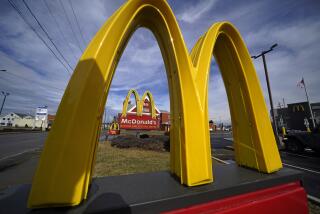Texas Ranchers Fear Backlash Over Mad Cow
- Share via
HOUSTON — Shane Sklar would like you to know what he had for dinner last night: a big steak.
Sklar is the executive director of the Independent Cattlemen’s Assn. of Texas, a leading trade organization in the nation’s leading cattle-producing state. Like many in the industry, he awoke Saturday to reports that a cow in the U.S. had been confirmed to have had bovine spongiform encephalopathy -- mad cow disease -- and that the cow might have been from Texas.
Reaction to the reports came not only from Washington, where federal officials announced plans for DNA tests to identify the animal’s originating herd, but from as far away as Taiwan, where officials reinstated their nation’s ban on U.S. beef imports.
In Texas, industry leaders circled the wagons Saturday.
They pointed out that the cow was the only one confirmed infected among 388,000 animals tested in the United States in the last year.
There is no evidence that the cow entered the human food supply. Even if it had, the public would not have been at risk, Sklar said. The disease is typically confined to an animal’s spinal column and does not spread into muscle tissues that comprise cuts of meat consumed in the United States, he said.
“You are not going to find it in a ribeye. What we have is a very, very low prevalence of this disease in our country.”
But cattlemen know those arguments are often lost on the public, and that is no trifling matter in a state that is home to 151,000 ranchers, cattlemen and dairy farmers -- 15% of the nation’s total. Texas has about 14 million head of cattle, worth about $9.7 billion.
The previous case of mad cow disease in the U.S. -- discovered in 2003, in a cow imported to Washington state from Canada -- sent U.S. beef exports tumbling about $2.5 billion. Some fast food chains’ stock fell too.
It was not clear Saturday what Japan would do. The largest importer of U.S. beef until banning it in 2003, Japan had been talking with the U.S. about resuming imports. Taiwan, which also banned imports after the 2003 case, had only recently resumed imports.
The cattle industry in Texas has remained strong because of rising domestic demand, but many here are bracing for the impact of the new confirmed case of the disease.
“BSE should not even be a concern to the public because it is so rare,” said Tim Wilhelm, a rancher in Tulia, in northwest Texas, who owns about 5,000 head of cattle. “But it’ll have an effect on the market. I hope it’s short-lived, but you never know.”
Any such effect, industry leaders said, would be due not to a practical risk but to a hysteria that seems to follow mad cow disease more than other health-related events. “It’s a perception problem,” Sklar said.
Wilhelm said he believed foreign countries had seized on mad cow fears for trade leverage.
“It’s just been sensationalized,” he said.
Texas industry leaders, meanwhile, say they are frustrated that they have been unable to get more information on the infected animal since the U.S. Department of Agriculture confirmed the case Friday.
They have been unable to confirm, for example, the age of the animal or whether it lived in Texas. The cow, slaughtered in November, is believed to have been born before the 1997 Food and Drug Administration ban on feeding ruminant meat and bone meal to cattle.
Feed derived from the remains of cow and sheep is thought to be a leading cause of the disease’s spread. In humans, the disease has no treatment and is fatal.
“Naturally we want to have zero percent,” said Dr. Michael Vickers, a South Texas veterinarian who owns three ranches and about 160 head of cattle being raised for beef. “But for just one to show up -- that is a very, very small percentage. We are cautiously optimistic that nothing else will show up and they’ll be able to get a handle on this.”
More to Read
Sign up for Essential California
The most important California stories and recommendations in your inbox every morning.
You may occasionally receive promotional content from the Los Angeles Times.














